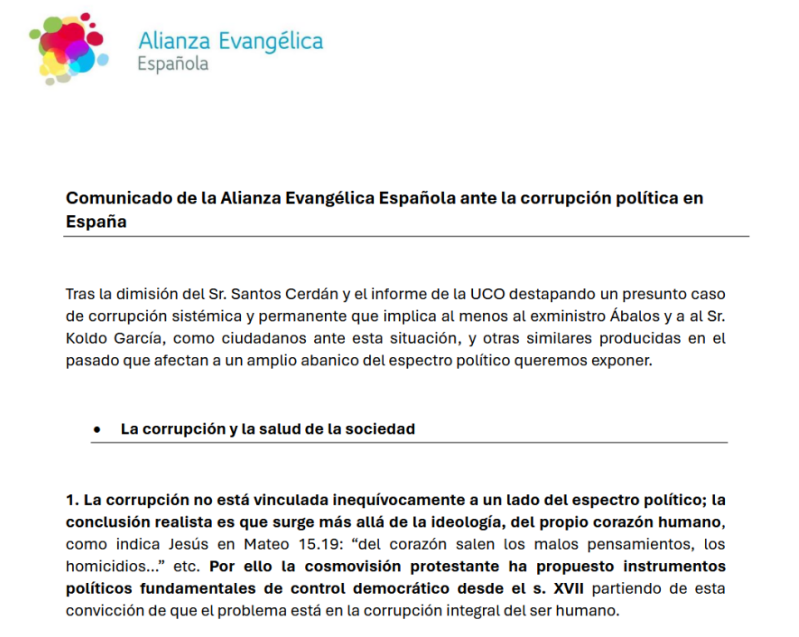In a lengthy statement, the Spanish Evangelical Alliance (AEE) reflects political corruption from a biblical perspective, seeking greater integrity to the system and urges citizens not to succumb to skepticism.
The latest corruption scandal involving senior Spanish politicians has sparked public protests. A recent investigation by Guardia Civil Police’s Central Operations Force (UCO) has involved top PSOE (Social Democrats) leaders such as Joselle Is Avalos (Development Minister) and Santos Celdan on suspicion of illegal payments related to public contracts.
In this context, the Evangelical Alliance issued a statement offering critical and positive reading from the worldview of evangelical Protestant Christians.
“Corruption comes from the human heart.”
“Corruption is not clearly linked to one side of the political spectrum,” the statement said. Beyond ideology, he asserts, “It arises from the human heart itself,” and recalls the words of Jesus in Matthew 15:19.
Based on this, the AEE explains that Protestant tradition has defended the need for democratic control mechanisms since the 17th century due to the recognition of human-specific corruption.
They point out that current scandals are not isolated cases, but rather reflect structural dynamics. “I am saddened that this and other cases lead to deep despair and disillusionment towards the political class. We see corruption not appearing in isolated cases, but from people at the top of the parties.”
However, they appreciate that “there is a functioning legal management mechanism” and that it is possible to build politics on “members of integrity and consistency.”

Integrity, general value
Faced with the obvious advantages of general pessimism and materialistic standards, the AEE believes that “integrity in the face of corruption has become the general ethical standard in this political moment.” According to the statement, this observation also contributes to Spanish evangelicals, according to the “space for analysis from a value-based perspective.”
From the Bible they remember that one of the nation’s purposes is to promote justice (Romans 13:3), and they lament that “corruption degrades its purpose.” They also highlight the validity of biblical principles by quoting Proverbs 17:23.
Multiplier effects of corrupt leaders
One of the central themes of the statement is the multiplier effect that political leaders have on the ethical culture of society. “There is a multiplier effect on corruption in public services,” they argue. Not because politicians are more corrupt than other sectors, but because “they are visible models to others.” This is reflected in many Old Testament accounts, such as the King’s Book.
“The general example is not an ideal, but a position-specific obligation,” the text adds, recalling that leadership must align with the values it promotes. Without sincerity, “Authority has lost its legitimacy and public trust has been broken.” The gospel also reminds us of the great responsibility of the previous leader of God: “Many people need many” (Luke 12:48).
Democracy, transparency, control
The AEE emphasizes the virtues of democratic institutions despite their imperfections as guarantors of control and accountability mechanisms. “Our politicians should know the Bible better to discover that “nothing hidden is unrevealed” (Matthew 10:26).
In addition to pointing out those directly involved in the plot, the statement encourages a review of public procurement policies. “More effective measures must be taken to prevent so many honest businessmen from being excluded from the contract.”
Without proposing constructive alternatives, the Alliance has added a call to opposition parties that is “not seductive” by “simple political opportunism” to criticism of the government for its responsibility in the corruption case. “This is not just a change in government, it’s a profound democratic revival,” they argue.
They also point out that Spain is lagging behind international transparency indicators and warns of the risk of “wide-spread skepticism,” which could lead to increased populism and dissatisfaction with democratic institutions.
Calling for restoration
In the final part of the text, the Evangelical Union brings a series of appeals. First, for the government and opponents, we acknowledge mistakes and take accountability to practice responsible regimes, promote transparency and become a moral example of citizens. They also reject all forms of corruption to citizens “including Christians” and live with ethical consistency even in everyday corruption.
“I warn that corruption is assumed to be unworthy to indict. It is not only corruption itself, but also tolerance towards me that can defeat society.”
This statement welcomes Prime Minister Pedro Sanchez’s gestures for forgiveness, which is an increasingly unusual culture. But they point out that true forgiveness also means “accepting responsibility and restoring the damages that have been inflicted,” as shown by the story of Luke’s Zacchaeus.
Gospel Principles for Public Life
The AEE concludes its statement with affirmation of hope: “We believe that Spain has hope if the Bible principles of integrity, justice and service apply.” Social transformation begins at the heart of each individual when it is permitted to be renewed by the gospel of Jesus Christ.
The Alliance continues to pray for the people of the government, to “proclaim the truth of love,” and to assert its commitment to working with other departments of society.
“Corruption is not just a legal deviance, it is a serious moral violation that undermines the trust of people, impoverishing the most vulnerable people and destroying the pillars of a just society,” they say. In this respect they invoke the condemnation of the Prophet Micah. “The prince demands, the judge sells himself for money, the great man speaks of the greed of his soul, and they all conspire together” (Micah 7:3).
They conclude with an equally relevant call for both governments and citizens, as ever.
The full statement can be read in full on the Spanish Evangelical Alliance (Spanish) website.
Originally published by the Evangelical Focus
